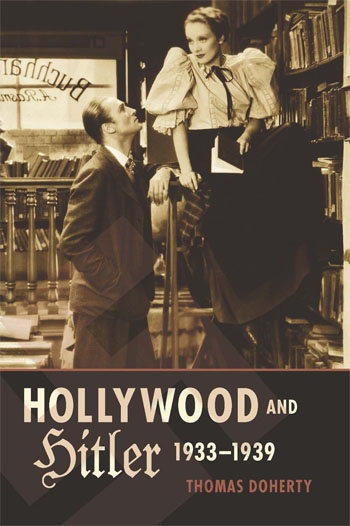In the New York Times, Dave Kehr notes that, “as Thomas Doherty forcefully establishes in his wide-ranging and brightly written new book, Hollywood and Hitler, 1933-1939, Nazis were all but invisible in American movies at the time when depicting their savagery might have done the most good. Doherty, a film historian and professor of American studies at Brandeis University, points out that a great majority of American studios went out of their way to avoid any mention of the ominous political developments in Germany from the moment of Hitler’s rise to power in 1933 until well into 1939, when the outbreak of war in Europe had come to seem inevitable.” You can read an excerpt at PopMatters.
“Cinephiles of recent vintage may not immediately recognize the name John Francis Lane, but his face will certainly be familiar to devotees of Italian cinema,” writes Kevin Flanagan for Special Affects. “Lane had supporting roles or cameos in many of the most important Italian films of the 1960s and early 1970s, including Fellini’s La Dolce Vita (1960), 8½ (1963), and Roma (1972), and Pasolini’s La Ricotta (1963, a segment of the anthology film RoGoPaG) and The Canterbury Tales (1972). Of course, his experience goes beyond films by internationally renowned auteurs: he also appears in genre fare like Maciste all’inferno (1962, known Stateside as The Witch’s Curse) and Lucky Luciano (1973). But while Lane now has recognition for his participation in these films, it is as a cultural correspondent, journalist, and film critic that he really makes his mark. To Each His Own Dolce Vita is Lane’s memoir of his first 15 years as an English expatriate in Rome, where he was uniquely poised to chronicle the ups and downs of a particularly turbulent period in the Eternal City’s history.” Lane has just written a remembrance in the Guardian of Franca Rame, actress and playwright, politician and “wife and professional partner of the actor-playwright Dario Fo.”
Currently working on his book on Hollywood in the 1940’s, David Bordwell discovers and unpacks “some barely noticeable jabs and in-jokes” Preston Sturges planted in The Miracle of Morgan’s Creek (1944).
At Criticwire, Matt Singer presents an excerpt from Rainer on Film: Thirty Years of Film Writing in a Turbulent and Transformative Era in which Christian Science Monitor film critic Peter Rainer looks back on “his life as a critic, from watching the Million Dollar Movie on New York television to working alongside the crime reporters at the Herald Examiner. If, as Rainer says, ‘movies are like magic acts,’ then this is a fascinating peek behind the curtain.” Reviewing the book at Thompson on Hollywood, Aljean Harmetz finds that “dipping into his sentences is always fun even when you might argue with his conclusions.”
For news and tips throughout the day every day, follow @KeyframeDaily on Twitter and/or the RSS feed. Get Keyframe Daily in your inbox by signing in at fandor.com/daily.




